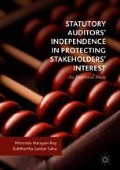Abstract
This chapter presents a conceptual discussion of the ‘Ethical Responsibility of Statutory Auditors in the Backdrop of Corporate Accounting Scandals’. Respondents to the fieldwork discussed in Chap. 4 identified a number of key variables that impact on the ethical responsibility of statutory auditors. In this chapter, their opinions on those variables are analysed in order to draw some salient conclusions on this particular theme. Five major factors are identified which play an important role in impacting the ethical responsibility of statutory auditors, of which the ‘regulatory framework and recent events’ is believed to be the most significant. The theme of ethical responsibility is represented by four key distinct dimensions: (a) existing regulation and its inherent limitations, (b) behavioural improvements, (c) global and social approach, (d) education and training in ethics. In this chapter, the opinions of different occupational categories are critically evaluated. While professional accountants (chartered accountants and cost and management accounts) tend to place emphasis on ‘Practical Approaches of Education on Ethics to Professionals’, respondents from the academic fraternity, whether students or academics, give maximum importance to ‘Increasing focus on Ethics in Education’. Investors, who are the major impacted party of statutory auditors’ lack of ethical responsibility, emphasize punitive action and the inner values of statutory auditors. Corporate executives, finally, see the key governing factor of ethical responsibility as the regulatory framework and recent events.
Access this chapter
Tax calculation will be finalised at checkout
Purchases are for personal use only
Notes
- 1.
Bhattacharya, A. (2001, October). Ethics in Corporate Financial Reporting. Chartered Accountant, 50(4), 449–452.
- 2.
Duska, R., Duska, B., & Ragatz, J. (2011). Accounting Ethics. London: Wiley–Blackwell.
- 3.
Ibid., 34–49.
- 4.
Bakshi, S. (2000). Professional Ethics – Back to Basics. Management Accountant, 35(7), 499–501.
- 5.
Duska, R., Duska, B., & Ragatz, J. (2011). Op.cit., 34–49.
- 6.
Velayutham, S. (2003). The Accounting Professions Code of Ethics: Is It a Code of Ethics or Code of Quality Assurance? Critical Perspectives on Accounting, 15, 971–993.
- 7.
Fleming, A. (1996). Ethics and Accounting Education in UK: A Professional Approach? Accounting Education, 5(3), 207–217.
- 8.
Duska, R., Duska, B., & Ragatz, J. (2011). Op.cit., 63–64.
- 9.
Ray, P. (1995, May). Values, Virtues and Ethics – Degrees of Compromise. Chartered Accountant, 43(10), 1483–1494.
- 10.
Gaur, S. (1997, August). Factor Analysis of Developing Countries. Journal of Policy Modeling, 19(4), 407–415.
- 11.
Sarkar, P., Bhattacharya, S., & Sengupta, P. (2011, July–September). Perspectives of Ecological Behavior and Attitude to the Environment: An Empirical Analysis of Kolkata Citizens. Asia–Pacific Business Review, 7(3), 176–187.
Bibliography
Books and Book Sections
Research Papers and Working Drafts
Judiciary Case Decision
Duska, R., Duska, B., & Ragatz, J. (2011). Accounting Ethics. London: Wiley-Blackwell
Gowthrope, C., & Blake, J. (1998). Ethical Issues in Accounting. London: Routledge
Jeffrey, C. (Ed.). (2004). Research on Professional Responsibility and Ethics in Accounting – Volume 9. Bingley: JAI Press
Bates, H., Waldrup, B., & Calhoun, C. (2008). Ethics Education in US Accounting Practices – A Status Report. Proceedings of the Academy of Accounting and Financial Studies, 13(1), 7–12
Chakrabarti, A. (1996). Ethics in the Era of Scam. Management Accountant, 31(11), 806–812
Chauhan, M., & Gupta, S. (2007). Ethical Audit: Stakeholders Perspective. Chartered Accountant, 56(5), 751–767
Copeland, J. (2005). Ethics as an Imperative. Accounting Horizons, 19(1), 35–43
Earley, C., & Kelly, P. (2004). A Note on Ethics Educational Interventions in an Undergraduate Auditing Course: Is There an Enron Effect? Issues in Accounting Education, 19(1), 53–71
Ghaffari, F., Kyriacou, O., & Brennan, R. (2008). Exploring the Implementation of Ethics in UK Accounting Programs. Issues in Accounting Education, 23(2), 183–198
Koumbiadis, N., & Okpara, J. (2008). Ethics and Accounting Profession: An Exploratory Study of Accounting Students in Post Secondary Institutions. International Review of Business Research Papers, 4(5), 147–156
Mayper, A., Pavur, R., Merino, B., & Hoops, W. (2005). The Impact of Accounting Education on Ethical Values: An Institutional Perspective. Accounting and the Public Interest, 5, 32–55
Pendergast, M. (2002, July). Conceptual Development in Professional Ethics and Accountancy. Chartered Accountant, 51(1), 58–59
Rau, S., & Weber, J. (2004). The Impact of the Enron Mega-event on Auditors’ Moral Reasoning. Journal of Accounting and Finance Research, 12(6), 106
Swanson, D., & Fischer, D. (2009). Business Ethics Education: If We Don’t Know Where We’re Going, Any Road Will Take Us There. Decision Line, 40(4), 10
Vittal, N. (2000). Ethics and Code of Conduct. Chartered Accountant, 49(5), 19
Council of Institute of Chartered Accountants of India vs. Shri S.N. Sachdeva, No.1/ 2002 (Delhi High Court 2011)
Author information
Authors and Affiliations
Rights and permissions
Copyright information
© 2018 The Author(s)
About this chapter
Cite this chapter
Roy, M.N., Saha, S.S. (2018). Ethical Responsibility of Statutory Auditors in the Backdrop of Corporate Accounting Scandals: An Analysis of Respondents’ Perceptions. In: Statutory Auditors’ Independence in Protecting Stakeholders’ Interest. Palgrave Macmillan, Cham. https://doi.org/10.1007/978-3-319-73727-0_5
Download citation
DOI: https://doi.org/10.1007/978-3-319-73727-0_5
Published:
Publisher Name: Palgrave Macmillan, Cham
Print ISBN: 978-3-319-73726-3
Online ISBN: 978-3-319-73727-0
eBook Packages: Economics and FinanceEconomics and Finance (R0)

